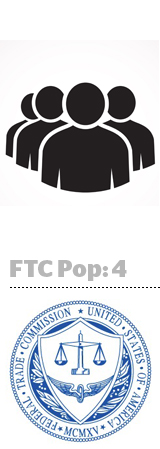
The Federal Trade Commission will soon be populated by a completely fresh crop of appointees with no holdovers from the previous administration.
It’s an irregular situation. But what it means for advertisers and for the commission’s future direction is still unclear.
President Trump finally sent his nominations for four commissioners out of five to the Senate on Monday: three Republicans, including antitrust lawyer Joseph Simons, who’s the likely pick for chairman, and one Democrat, Rohit Chopra, a former Consumer Financial Protection Bureau official.
The nominations are expected to pass congressional approval without any hassle.
With “that much turnover, it’s certainly possible that they could really change the direction of the commission,” said Dan Jaffe, group EVP of government relations at the Association of National Advertisers.
Possible, but unlikely.
“If I had to guess, I’d say we’ll see the commission likely follow along in the footsteps of [acting Chairwoman Maureen] Ohlhausen,” Jaffe said, which means a continued push for self-regulation coupled with an enforcement agenda focused on privacy protection and data security, especially in light of recent high-profiles breaches, including Equifax.
Although Simons, the putative chairman, is a diehard antitrust lawyer, that doesn’t necessarily conflict with light self-reg, said Lee Peeler, a consumer protection lawyer who serves as president and CEO of the Advertising Self-Regulatory Council and EVP of national advertising at the Council of Better Business Bureaus.
“One of the real strengths of the agency is that it brings together the principles of competition law with the principles of consumer protection law, and both concepts work in unison to promote a better marketplace for consumers,” he said.
Even after the nominations go through, there’s still a lot that’s still up in the air, including the question of jurisdiction between the FTC and the Federal Communications Commission. If net neutrality isn’t revived by Congress or in the courts, the FTC will regain authority over the consumer privacy practices of broadband providers, which could affect its enforcement agenda.
It’s also difficult to predict how the commission will act without knowing who the chairman-to-be will pick to lead the FTC’s three bureaus, including the Bureau of Consumer Protection, which deals with unfair and deceptive business practices and currently doesn’t have a permanent director.
But the unknown aside, taking the FTC from ghost town to full force can’t come soon enough, Jaffe said.
“We were really concerned that the FTC was so low-manned,” he said. “Without a full commission, any issue that was split Democrat vs. Republican couldn’t move forward, and if one person had for whatever reason been incapacitated, even for a little while, the FTC couldn’t have gone on, either.”
But to have all new people filling out the FTC is “unprecedented,” said Peeler, who served as a deputy FTC commissioner from 1973 until 2006. “I was at the FTC for more than 30 years and I can’t remember a time when all the commissioners were new,” he said.
In any case, the commission is long overdue for some fresh blood. The FTC has been operating without permanent leadership for months.
After commissioner Julie Brill, a Democrat, left the FTC in 2016 and then-chairwoman Edith Ramirez, also a Democrat, departed in February following Trump’s election, the commission was down to two: Ohlhausen, who was elevated to acting chairwoman, and Democrat commissioner Terrell McSweeny, whose term expired in September.
Trump recently nominated Ohlhausen for a federal claims court judgeship, which means she’s one foot out the door, and McSweeny’s likely only hanging around until reinforcements arrive because the commission can’t operate with fewer than two people.
This post was syndicated from Ad Exchanger.

More Stories
Around the World: AI & Christmas, a Temu crackdown and Aussie influencers
Here’s a Short Roundup for This Week
Melanie Spencer a finalist in Campaign’s Agency of the Year Awards